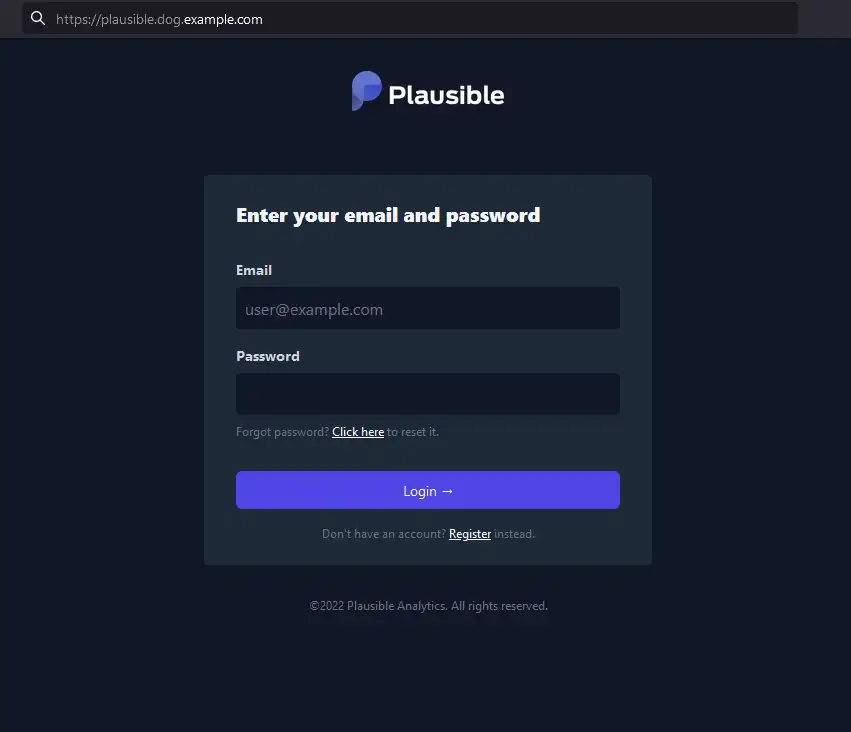Plausible analytics
Create a security key
export PLAUSIBLE_SECRET_KEY_BASE=$(openssl rand -base64 64 | tr -d '\n' ; echo)
Set the other variables (please replace them as appropriate for you)
export PLAUSIBLE_POSTGRES_USER=mypostgresuser && \
export PLAUSIBLE_POSTGRES_PASSWORD=mypostgrespassword && \
export PLAUSIBLE_ADMIN_USER_EMAIL=my@email.com && \
export PLAUSIBLE_ADMIN_USER_NAME=myadminusername && \
export PLAUSIBLE_ADMIN_USER_PWD=mysecretadminpassword
Apply the manifest with envsubst
cat plausible-localstorage.yaml | envsubst | kubectl apply -f -
plausible-localstorage.yaml
apiVersion: v1
kind: PersistentVolumeClaim
metadata:
name: plausible-clickhouse-pvc
namespace: default
spec:
accessModes:
- ReadWriteOnce
storageClassName: local-path
resources:
requests:
storage: 5Gi
---
apiVersion: v1
kind: PersistentVolumeClaim
metadata:
name: plausible-postgres-pvc
namespace: default
spec:
accessModes:
- ReadWriteOnce
storageClassName: local-path
resources:
requests:
storage: 5Gi
---
apiVersion: v1
kind: Service
metadata:
name: plausible-postgres
spec:
type: ClusterIP
ports:
- port: 5432
targetPort: 5432
selector:
app: plausible-postgres
---
apiVersion: apps/v1
kind: Deployment
metadata:
name: plausible-postgres
spec:
selector:
matchLabels:
app: plausible-postgres
replicas: 1
template:
metadata:
labels:
app: plausible-postgres
spec:
containers:
- name: plausible-postgres
image: postgres:13
env:
- name: POSTGRES_USER
value: ${PLAUSIBLE_POSTGRES_USER}
- name: POSTGRES_PASSWORD
value: ${PLAUSIBLE_POSTGRES_PASSWORD}
- name: POSTGRES_DB
value: "plausible_dev"
ports:
- containerPort: 5432
volumeMounts:
- name: plausible-postgres-volume
mountPath: /var/lib/postgresql/data
volumes:
- name: plausible-postgres-volume
persistentVolumeClaim:
claimName: plausible-postgres-pvc
---
apiVersion: v1
kind: Service
metadata:
name: plausible-mail
spec:
type: ClusterIP
ports:
- port: 25
targetPort: 25
selector:
app: plausible-mail
---
apiVersion: apps/v1
kind: Deployment
metadata:
name: plausible-mail
spec:
selector:
matchLabels:
app: plausible-mail
replicas: 1
template:
metadata:
labels:
app: plausible-mail
spec:
containers:
- name: plausible-mail
image: bytemark/smtp:latest
ports:
- containerPort: 25
---
apiVersion: v1
kind: Service
metadata:
name: plausible-clickhouse
spec:
type: ClusterIP
ports:
- name: http
port: 8123
selector:
app: plausible-clickhouse
---
apiVersion: apps/v1
kind: Deployment
metadata:
name: plausible-clickhouse
spec:
selector:
matchLabels:
app: plausible-clickhouse
replicas: 1
template:
metadata:
labels:
app: plausible-clickhouse
spec:
containers:
- name: plausible-clickhouse
image: yandex/clickhouse-server:21.3.2.5
volumeMounts:
- name: plausible-clickhouse-volume
mountPath: /var/lib/clickhouse
- name: plausible-clickhouse-config
mountPath: /etc/clickhouse-server/config.d/logging.xml
subPath: logging.xml
readOnly: true
- name: plausible-clickhouse-user-config
mountPath: /etc/clickhouse-server/users.d/logging.xml
subPath: logging.xml
readOnly: true
volumes:
- name: plausible-clickhouse-volume
persistentVolumeClaim:
claimName: plausible-clickhouse-pvc
- name: plausible-clickhouse-config
configMap:
name: plausible-clickhouse-config
- name: plausible-clickhouse-user-config
configMap:
name: plausible-clickhouse-user-config
---
apiVersion: v1
kind: ConfigMap
metadata:
name: plausible-clickhouse-config
data:
logging.xml: |
<yandex>
<logger>
<level>warning</level>
<console>true</console>
</logger>
<!-- Stop all the unnecessary logging -->
<query_thread_log remove="remove"/>
<query_log remove="remove"/>
<text_log remove="remove"/>
<trace_log remove="remove"/>
<metric_log remove="remove"/>
<asynchronous_metric_log remove="remove"/>
</yandex>
---
apiVersion: v1
kind: ConfigMap
metadata:
name: plausible-clickhouse-user-config
data:
logging.xml: |
<yandex>
<profiles>
<default>
<log_queries>0</log_queries>
<log_query_threads>0</log_query_threads>
</default>
</profiles>
</yandex>
---
apiVersion: v1
kind: Service
metadata:
name: plausible
spec:
type: ClusterIP
ports:
- port: 80
targetPort: 8000
selector:
app: plausible
---
apiVersion: apps/v1
kind: Deployment
metadata:
name: plausible
spec:
selector:
matchLabels:
app: plausible
replicas: 1
template:
metadata:
labels:
app: plausible
spec:
containers:
- name: plausible
image: plausible/analytics:v1.4.4
command: ["/bin/sh"]
args:
[
"-c",
"sleep 10 && /entrypoint.sh db createdb && /entrypoint.sh db migrate && /entrypoint.sh db init-admin && /entrypoint.sh run",
]
ports:
- containerPort: 8000
env:
- name: ADMIN_USER_EMAIL
value: ${PLAUSIBLE_ADMIN_USER_EMAIL}
- name: ADMIN_USER_NAME
value: ${PLAUSIBLE_ADMIN_USER_NAME}
- name: ADMIN_USER_PWD
value: ${PLAUSIBLE_ADMIN_USER_PWD}
- name: BASE_URL
value: https://plausible.${DOMAIN}
- name: SECRET_KEY_BASE
value: ${PLAUSIBLE_SECRET_KEY_BASE}
- name: DATABASE_URL
value: postgres://${PLAUSIBLE_POSTGRES_USER}:${PLAUSIBLE_POSTGRES_PASSWORD}@plausible-postgres:5432/plausible_dev
- name: CLICKHOUSE_DATABASE_URL
value: http://plausible-clickhouse:8123/plausible_dev
- name: SMTP_HOST_ADDR
value: plausible-mail
---
apiVersion: networking.k8s.io/v1
kind: Ingress
metadata:
name: plausible-ingress
annotations:
spec.ingressClassName: traefik
cert-manager.io/cluster-issuer: letsencrypt-prod
spec:
rules:
- host: plausible.${DOMAIN}
http:
paths:
- path: /
pathType: Prefix
backend:
service:
name: plausible
port:
number: 80
This should result in something like this:
persistentvolumeclaim/plausible-clickhouse-pvc created
persistentvolumeclaim/plausible-postgres-pvc created
service/plausible-postgres created
deployment.apps/plausible-postgres created
service/plausible-mail created
deployment.apps/plausible-mail created
service/plausible-clickhouse created
deployment.apps/plausible-clickhouse created
configmap/plausible-clickhouse-config created
configmap/plausible-clickhouse-user-config created
service/plausible created
deployment.apps/plausible created
ingress.networking.k8s.io/plausible-ingress created
And your plausible instance should now be accessible at https://plausible.dog.example.com
